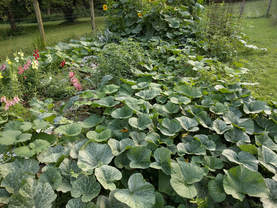 Matthew 13:2-9 Hey gardeners – how are your gardens doing this warm, wet summer? We planted squash, sunflowers, snapdragons, cilantro, basil, tomatoes, parsley, peppers, kale, eggplant, Brussels sprouts and a few other things. We had a luscious patch and a lean patch, we transplanted a few puny plants, we weeded and mulched and started nibbling on herbs and kale. Then I left for Annual Conference three weeks ago. By the time we got back last week the squash had overtaken everything but the tallest tomatoes and sunflowers. Leaves large as beach balls. Vining in all directions, through tomato cages. We balked, laughed, shook our heads, and got out clippers to find all those herbs and veggies we’ve been looking forward to eating. Some of you are serious gardeners, but even if you’ve just flirted with flowers or looked into landscaping, I bet you can relate to the sower in today’s parable. We have so little control over what grows from the earth, just where and when it pops up, and even when something grows, keeping up with pests and threats reminds us how little power we have in a plant’s destiny. 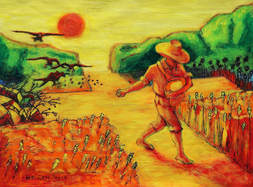 Biblical scholars and the rest of us who read scripture say that to plumb the depths of a parable we should try on each character in the story. What does this parable provoke in me when I am the sower? What does this parable provoke in me when I am the seed? Does anyone relate to the birds or the thorns or the path? Most people read this story as the seeds, thinking God or Jesus is the sower, and we, people of faith, are the seeds. So if you’re like most Christians you hear this story and start analyzing yourself – am I a strong plant in good soil producing outrageous harvests of righteousness, generosity, compassion, self-control and all those faithful fruits? Doubt creeps in…we know we’re not perfect, we know we miss opportunities to lend a hand or share our time or give money or spread the good news. Who are you in the story? Seed eaten by birds on the path, or withering without roots, or choked by thorns and weeds? This parable of the sower is in Matthew, Mark and Luke. In Matthew, Jesus explains the first seeds, the ones that fell on rock, this way: “When anyone hears the word of the kingdom and does not understand it, the evil one comes and snatches away what is sown in the heart; this is the seed sown on the path.” Since we’re all here, in a faith community, seeking God, striving to live in the way of Jesus, I think we can confidently say that we’re not the seed that fell on the path and was eaten by birds. Jesus goes on to say of the seed that withered under the scorching sun on the rocks, “this is the one who hears the word and immediately receives it with joy; yet such a person has no root, but endures only for a while, and when trouble or persecution arises on account of the word, that person immediately falls away.” This might be us, at least from time to time. Our roots are deep enough that we’re here today, engaging faith and community when we could be sleeping in or watching TV or otherwise avoiding struggle. But do you ever wither in the midst of trouble? Most of us have kept silent in the face of persecution at least once – whether we were failing to speak up for what Christ teaches us, or failing to defend someone being bullied, or failing to stand up for ourselves.  The story implies that we, theoretically the faithful finishing the story with Jesus, are the seeds that fall in good soil, have no troubles, and yield abundant grain. But that doesn’t fit, either. We fall short. We fail to be fruitful. We have troubles. Jesus says of the seeds among weeds, “As for what was sown among thorns or weeds, this is the one who hears the word, but the cares of the world and the lure of wealth choke the word, and it yields nothing.” I feel like the seed among weeds – maybe you do too? – dealing with the cares of the world and the lure of wealth and still yielding rich physical, emotional and spiritual nourishment on our best days. We do this in the midst of flooded soil, scorching sun, choking weeds, biting thorns, and pesky critters. As strong plants amidst weeds, we have a heartier story to tell than the simplistic way we could read this parable. What is a weed? A plant we don’t want. But weeds to one person might be a salad of lamb’s quarter and dandelion greens to another. We can’t see the big picture, let alone the future, we don’t know what God’s plan for thistles or buckhorn might be – but didn’t every plant come from God’s design? As seeds among weeds we’re surrounded by other people who on some days seem like healthy, fruitful plants, and other days seem rather weedy. We should trust that we seem like weeds to other people too, when we’re impatient on the phone with customer service or avoid eye contact with the person asking for spare change or when we yell at our spouse or kids or dog cause we’re having a bad day. The weeds we live with aren’t always people, they can be the traumas and temptations and distractions and disappointments we live with. Who would you be without the weeds of your life? Without the heartbreaks and injustices and illnesses and assaults, who would you be? Would you have grown as tall, stretching beyond these weeds to soak up the sun’s gifts? Would you have grown as strong, keeping yourself upright as invaders and intruders lean into you? Would your skin have grown as thick, protecting yourself from attack? Would you have become so colorful, drawing bees and butterflies to your flowers to pollinate you? If you had grown up a potted plant, sheltered from wind and beetles, nourished with consistent water and specialized soil, fed with sunlight and grow lights, protected from competitive weeds or hungry rabbits, how satisfying would your yield be? We wear scars and bear injuries and carry pain because of thorns and weeds – the truth is that what harms us can eventually benefit us, and that doesn’t justify the harm, it doesn’t mean it’s God’s plan, and it doesn’t mean we should idealize or idolize suffering. But we can still find benefits of thorns and weeds. At this year’s Church of the Brethren Annual Conference we realized once again that there are deep divisions among us. Not only do we disagree about all sorts of theological and political issues, but we have serious conflict about what topics we should even be talking about. For some people, racial justice and equality for LGBTQ people are essential parts of God’s vision for humanity. For others, these topics are distracting weeds, dangerous thorns, that endanger God’s plan for humanity. Who decides what’s a fruitful plant and what’s a weed? 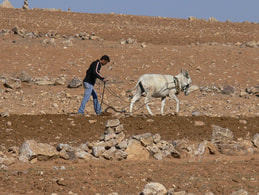 This parable of the sower, or if we’re reading it this way it’s really the parable of the seeds, makes more sense in Palestine. We don’t plant by tossing seeds here and there, we usually dig a bit, put in a seed, and cover it. But broadcast seeding – scattering seeds – was common in Jesus’ day, and it’s still done by some Palestinian farmers today. I traveled in Palestine and Israel with Christian Peacemaker Teams a few years ago and watched Palestinian farmers plant. After spreading seed, farmers return and plow the land, covering the seeds in soil. Farming in such a dry, rocky land is truly an act of faith, and it is an essential one, because most Palestinians don’t have options for earning money to buy their food at grocery stores. Like this farmer in the small village of At-Tuwani. With fewer than 200 residents, they didn’t have their own schoolhouse, so the children walked about a mile to the next town for school. They passed an illegal settlement of extremist Israelis along the way, who would throw stones at the children, taunt them, harass them. 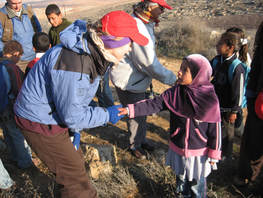 So the village asked Christian Peacemaker Teams to walk with the children to school. And for years they did, and some of these extremist Israeli settlers harassed the Christian Peacemaker Team members, and even attacked some with chains. These extremist settlers also poisoned the village well, killed livestock, and fired shots at the farmers in their fields. The villagers studied nonviolent movements, read Gandhi and King by candlelight (electricity comes an hour or two a day, if at all). They welcome guests from around the world to learn with them. There is nothing thornier that these struggles. Yet these weeds have not choked the life of this village. What would these Palestinians yield if they weren’t victims of violence and oppression? We’ll never know. But amidst thorns this village yields creativity and ingenuity in the women’s sewing cooperative. Working without machines women choose to add this extra job into their long days to raise money for a school in the village, keeping their children close and safe. 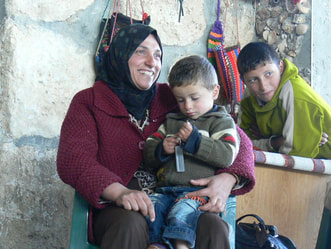 Keefah, the leader of the co-op, learned to write grant proposals and traveled to other countries to speak about At-Tuwani, yielding new opportunities for all the village’s children, especially the girls who see a woman celebrated for leadership. Without the cruel weed of violence, At-Tuwani wouldn’t foster such solidarity and creativity, and though it took several years, they’ve built their own school. Whatever the weeds are in your life, what use can you find for them? How do they help your roots grow deep and your spine grow strong? Those thorns, the struggles that keep you from celebrating yourself, sharing yourself in relationships, contributing yourself at church, might it be that these weeds are the reasons you have so much to offer? May we be a community that flourishes together, and empowers each person here to yield great gifts. May we be a community that fosters good soil - emotionally, physically and spiritually. 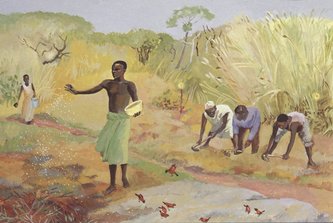 And what’s up with that sower, anyway, who scatters seed onto a footpath, into thorns, onto rocks? Where’s the test garden, the straight rows, the climate control, the irrigation, the scarecrow? What if Jesus didn’t tell this parable so we’d all worry that our roots are too shallow or we’re too distracted by weeds – what if Jesus told this parable so we’d scatter the good news like candy in a parade, like rice at a wedding? Like blowing bubbles or spreading rose petals or sharing pictures of a new grandchild – what if Jesus tells this story to remind us to love that good news so much that we send it out into the world with abandon! Abundantly sharing what we love without fretting about the outcome. I think about that squash taking over our garden. We planted some of it, but even more came up volunteer. The squash we didn’t pick last fall, what we couldn’t find under those beach ball leaves rotted and some of its seeds found freedom and new life and erupted into our garden. We made plans, we plotted rows, we marked butternut here, acorn there, and the squash laughs. Good news! God is a sloppy sower, loving life so much that God sends it into every corner of creation, taking delight when we flourish, and oohing and ahhing when we bloom, and trying over and over again when we wither. If you’re a tidy gardener please don’t take this metaphor too literally. Go ahead and plant straight rows and pull weeds. But what do you love so much that you sow it everywhere you go? What do you believe in so deeply that you’ll share that good news even when no one cheers you on? Follow your heart, let your passion lead you, scripture says. Even to God’s people in exile, the prophet proclaims on God’s behalf, “You will seek me and find me when you search for me with all your heart.” Let your whole heart lead you into God's green, growing world as seeds of mercy, seeds of justice, sowing merrily.
1 Comment
Beth
7/17/2017 04:53:29 am
Bless you, Anna Lisa! And thank you for a very inspiring start to the day!
Reply
Leave a Reply. |
Archives
January 2022
|
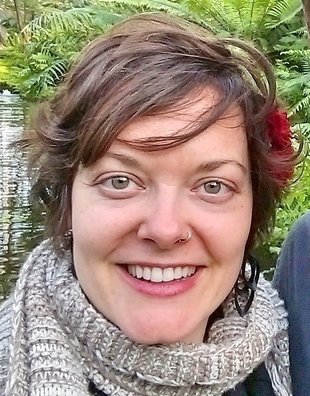
 RSS Feed
RSS Feed